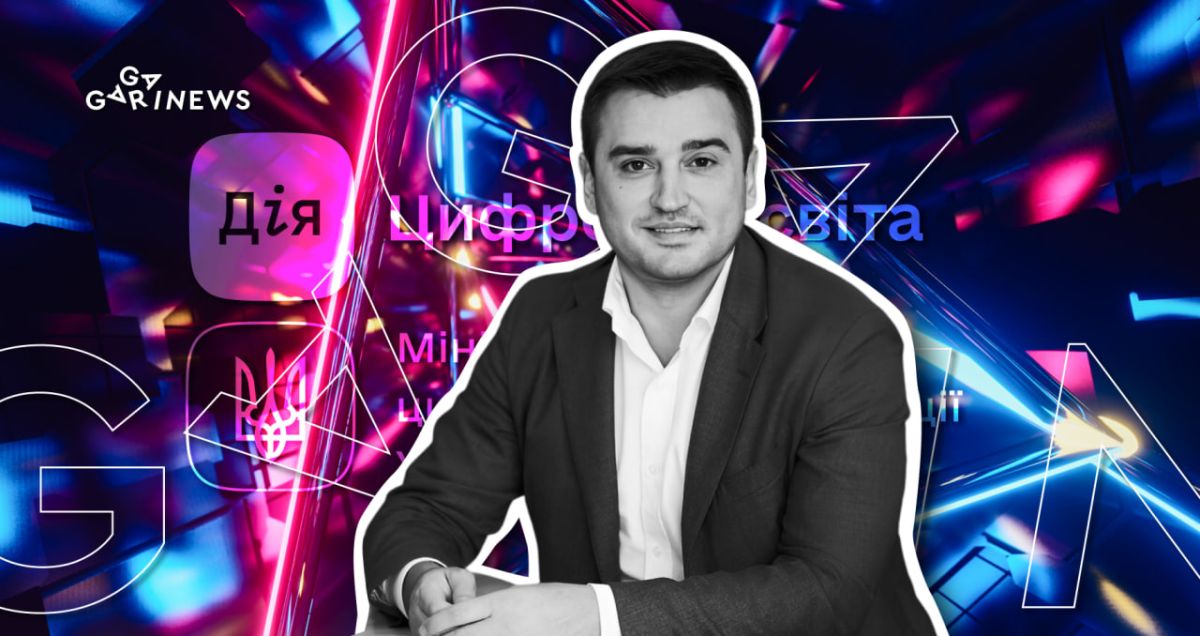Alex Bornyakov: We possess the capacity to create our own trends

The “Diia. Digital Education” portal offers free learning through expert and celebrity-led educational series. We spoke with Deputy Minister Alex Bornyakov to gain insights into the learning process and eligibility criteria for taking advantage of this opportunity.
On this page
GN: Hello, Alex! We’re very grateful that you have agreed to take the time to answer some questions about the “Diia. Digital Education” project.
Alex Bornyakov: I’m happy to be here and answer your questions.
GN: On February 28, the Ministry of Digital Transformation launched a large-scale free course on crypto literacy for Ukrainians. It goes beyond the typical video lessons that explain crypto terms. Who is this course aimed at? Should people who are not familiar with blockchain or digital technologies still register?
Alex Bornyakov: Certainly. The aim of our course is to teach Ukrainians how to use virtual assets properly, regardless of their current level of knowledge. Even if someone is not familiar with digital assets, they can still learn basic skills and understand the fundamental concepts of the crypto industry. The course is designed to start with simple topics and progresses to more complex ones. Furthermore, if something is unclear, students can go back to previous lessons as many times as needed.
GN: Has a similar project been implemented in other countries? Or are you the first government agency to apply this format of teaching crypto literacy to citizens?
Alex Bornyakov: I believe that in the private sector of every country with an audience actively using virtual assets, this format of education is being applied, as demand creates supply. At the same time, it is important to understand that Ukraine is among the leaders in the adoption of digital assets and in many areas is ahead of others. Education is no exception. Therefore, our state should spread this information as widely as possible. We are studying global experience, but we are not going to duplicate it. In the field of blockchain and cryptocurrencies, we are capable of creating our own trends that others will follow. And that’s exactly what we are doing.
GN: Please tell our readers more about the training format.
Alex Bornyakov: The course provides for 100 study hours available on the “Dіia. Digital Education” platform. All classes are held online and are not limited to theory. Students get hands-on experience by studying real-life cases and creating their own. The course is designed to be flexible, allowing participants to progress at their own pace.
The course material is presented in a variety of formats, including videos, texts, and practical tasks. Once the students complete the course, they will take a test to obtain their Digigram Certificate. Additionally, they will receive separate certificates for each module completed.
GN: Can students choose which modules they need and ignore others?
Alex Bornyakov: The course is divided into four sections, each consisting of several topics. Students can choose which topics to study based on their own preferences, as we have people with varying levels of knowledge and expertise.
GN: Will the new education project cover NFT, DeFi, and Metaverse topics?
Alex Bornyakov: Yes, these topics are covered in the third module, which was published last week. In addition to the metaverse, NFTs, and decentralized finance, the third module provides a detailed examination of the DAO topic and practical exercises to help students master the material. Students will learn how to mint their own tokens and put them up for sale, as well as gain insight into the nuances of some platforms. A test network has been created where students can practice the skills they've acquired. On March 21, we released the final fourth module on the platform, so the most dedicated students can soon complete the course.
GN: Our media outlet is aimed at both advanced crypto adepts and those who are only beginning their journey in this field. Will your course cover real working cases for those who plan to invest or are already investing in digital assets?
Alex Bornyakov: There’s a well-known joke where a novice trader asks an experienced one, “How much do I need to invest in crypto to earn a million?” And the experienced trader replies, “Probably two million would be enough.” But to answer your question, our trainers focus on practice, not just theory.
The idea behind our educational crypto course on Diia. Digital Education was to equip individuals with not only academic expertise but also practical skills. Our experienced trainers work with crypto and blockchain every day and share their knowledge with our students. They provide an insider's perspective on the market and analyze real-world cases with them.
But we couldn't have done it without our amazing partners and specialists. We teamed up with some of the biggest names in the industry, including European cryptocurrency exchange of Ukrainian origin WhiteBIT, the Filecoin Foundation for the Decentralized Web, the social metaverse Atlantis World, the blockchain project Aragon, the Zapper.xyz app, the Safe platform, the Optimism Foundation, and zkSync.
They provide their platforms as a simulator, allowing our students to get hands-on experience and apply what they learn in a practical setting.
GN: How difficult is it to pass the exam and obtain the Digigram
certificate?
Alex Bornyakov: The exam is a 30-40 minute test that is graded by a program, making it impossible to cheat. It's difficult to say if all students pass the test since each person has their own pace when it comes to completing the course. Some might complete a module in just three days while others may take three months. It's a very individual process. Although some people might find the exam challenging, but I'm not aware of any cases like that at the moment. We might analyze this in the future to get a clearer picture.
GN Where may this certificate come in handy?
Alex Bornyakov: Obtaining a certificate is a great incentive to learn something new and a signal that one has a good understanding of digital technologies, which can be listed on a CV. It shows that you have finally mustered the strength and time to grasp the workings of the blockchain (laughs).
In fact, this is crucial not only for government officials who need to adapt to new realities but also for public sector employees, such as teachers and doctors, as online technologies are already transforming these domains.
GN: What does the Digigram certificate look like? Where can one obtain it?
Alex Bornyakov: It's a regular PDF file that is sent to the student's email after passing the test.
GN: According to the “Diia. Digital Education” website, the project includes an offline aspect, which is a network of partner hubs for digital education across the country. Could you please explain what this entails and how Ukrainian residents can take advantage of this opportunity?
Alex Bornyakov: This initiative was actually launched three years ago, even before the course was introduced. It brings together various networks of libraries, schools, universities, and both public and private institutions, all of whom have agreed to assist the Ministry of Digital Transformation in educating Ukrainians. There are now over 6,000 partners participating in this effort. The project encompasses not only cryptocurrency but also digital literacy and training on cybersecurity fundamentals in a broader sense.
GN: How would you assess the level of Ukrainians’ proficiency in digital currencies and blockchain technology? Have the course instructors provided any feedback yet?
Alex Bornyakov: Well, I've heard a lot of positive feedback from representatives of other countries who have recognized that we have a really impressive community here in Ukraine that has a solid grasp of digital technologies. Many foreign companies have noted that we have a large audience eager to develop this industry. This is not just my personal observation, but an objective view from outsiders as well. There have also been analytical studies that confirm Ukraine's position as a leader in cryptocurrency adoption among the population in 2022, ranking it third in the world after Vietnam and the Philippines. We also rank in the top five for non-cash payments. In short, we have a very high level of awareness of the crypto industry.
GN: You've studied and worked in the United States and have also looked at Israel's experience. How would you compare the level of crypto literacy among Ukrainians to that of residents of other countries?
Alex Bornyakov: Comparing Ukraine to the United States wouldn't be entirely fair since our population size and financial history are quite different. However, we are catching up quickly, and there is a lot of enthusiasm for digital assets that could help us overtake the US soon.
For example, while Israel has many companies and entrepreneurs involved in virtual currencies, the average person there is not as adapted to these technologies because of their strict banking control and regulation. This has limited the everyday use of cryptocurrency.
In terms of a general understanding of financial markets and how they work, we are still behind other countries. This is because their stock markets have been around for centuries. While we were still getting paid in cash coupons, Americans had already adopted credit cards as a normal part of their financial transactions.
In the United States, it's common for even ordinary citizens with average incomes to invest in securities or other assets. We're just beginning to enter this space, but our online banking system is already much more advanced than Europe's.
GN: Ukraine is currently facing its most challenging war, and amidst this difficult time, the Ministry of Digital Transformation is promoting blockchain and digital assets. Have you faced any criticism for this initiative? And what would you say to those who believe that it's not the right time for such a project?
Alex Bornyakov: When we announced our blockchain course, we were blown away by the response – we received over 20,000 pre-registrations right off the bat. I think these numbers speak for themselves. They show that Ukrainians have a genuine interest in this type of training. With so many people in our country losing their jobs and income due to the war, we believe that this course could provide a potentially new avenue for business development. People are searching for new opportunities in these changing times, and we want to help them adapt to the new conditions. We can't go back to the way things were before, but by embracing new perspectives and technologies, we can shape a better future. It's up to us to seize these opportunities and create something new and exciting.
The content on The Coinomist is for informational purposes only and should not be interpreted as financial advice. While we strive to provide accurate and up-to-date information, we do not guarantee the accuracy, completeness, or reliability of any content. Neither we accept liability for any errors or omissions in the information provided or for any financial losses incurred as a result of relying on this information. Actions based on this content are at your own risk. Always do your own research and consult a professional. See our Terms, Privacy Policy, and Disclaimers for more details.

























